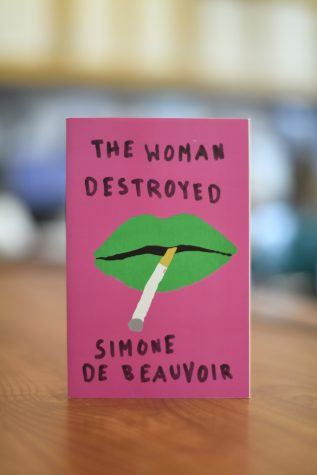A Review of Simone de Beauvoir’s ‘The Woman Destroyed’
Edie Fine ’21, Book Reviewer.
Simone de Beauvoir declared herself an author and a midwife of partner Jean Paul Sartre’s intellectual endeavors, rather than a philosopher. In her eyes, she wove complex existentialist and feminist ideology into her fiction and writing, rather than using her writing as a vehicle to disseminate her philosophies.
But certainly those two labels coexist, and though she didn’t consider herself a philosopher, history considers her one of the best. Simone de Beauvoir didn’t ever heed a reader’s call to become more accessible. We called her a philosopher; she rejected the label. Maybe she was being humble, or maybe she just did not desire to fit into the box that the public had created for her.
In her novella collection The Woman Destroyed, De Beauvoir intends to give the reader a challenge; she presents her stories through nearly impenetrable language and asks that they devote the effort to decoding. The second of the three novellas, The Monologue is, amongst a plethora of other, more sophisticated descriptive phrases, exhausting. Told through the style of a Joycean stream of consciousness, I felt like I barely took a breath while reading it. At least the lack of periods, commas, colons, and other punctuation markers failed to inform me as to when I could breathe. It invoked a confrontation between author and reader.
De Beauvoir did this by design. The first line of the story reads “The Monologue is her form of revenge.” She knows how agonizing it must be to endure the seemingly endless soliloquy, so she employs it to make a point. De Beauvoir demands the attention of the reader, challenging her to persevere through an avalanche of disarrayed thoughts and words. She claims space for herself, knowing that she deserves it.

The cover of the Pantheon paperback edition of ‘The Woman Destroyed’ is striking. As a review noted in ‘The Atlantic,’ the book is “Witty, immensely adroit . . . These three women are believable individuals presented with a wry mixture of sympathy and exasperation.”
In each of the three novellas—The Age of Discretion, The Monologue, and The Woman Destroyed—a woman confronts an undoing, of sorts, within her familial life. Though the level of hysteria within each novella differs, cries of rage, loneliness, and despair flow through all of the pages. De Beauvoir plays with the notion of hysteria; she recognizes the stereotype of hysterical women, and dismantles it by reclaiming it. Each story demands validity for each protagonist’s emotions, even when they play into the stereotypes.
In each case, the protagonist is struggling with meaninglessness. She feels she is unneeded, unloved, or left behind. In Age of Discretion, the narrator struggles with losing her son to his wife and opposite political and social ideologies. He repudiates the life that she has calculated for him, and she battles rejection. In The Monologue, the narrator’s vitriolic diatribe exposes anguish and bitterness as a result of losing her daughter to suicide and the subsequent severing of ties with her husband and other family members. The Woman Destroyed chronicles the evolution of another woman’s emotional journey after realizing that her daughters had become self sufficient, and her husband was having an affair. In each case, the narrator is exposed to an inherent lack of meaning in life, especially in the lot often doled out to women.
Thus, the novel is undeniably existentialist, and unquestionably feminist. But it doesn’t fall into stereotypical tropes of either genre. The overt subversion of the patriarchy has, for some, in many of her writings, clouded the embedded philosophical phenomenological-existentialism (the study of existentialism through the first person point of view). The irony of her admission into the realm of the philosophers lies in the fact that the perpetuation of patriarchy, of which she was attempting to dismantle, may be to blame. Many assumed her to be simply a disciple or a student of Sartre, rather than her own unique philosophical bluestocking. The Woman Destroyed is an invitation to the reader to acknowledge the absurdity of these notions.
The novel is undeniably existentialist, and unquestionably feminist. But it doesn’t fall into stereotypical tropes of either genre.
Edie Fine (she/they), an Editor-in-Chief for ‘The Science Survey,’ is thrilled to be on the journalism staff for a second year. She loves telling stories,...
Taylor Chapman is the Editor-in-Chief of ‘The Science Survey’ and an Academics Section Reporter for ‘The Observatory.’ The learning experience...











